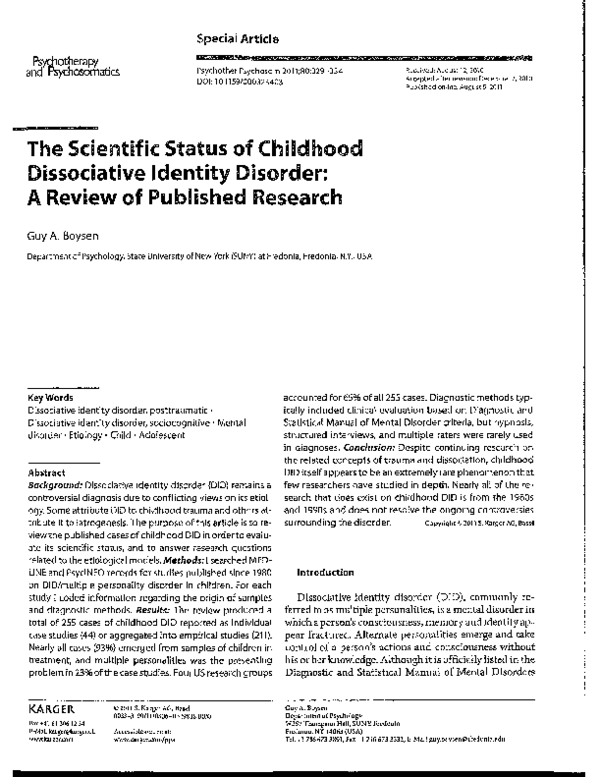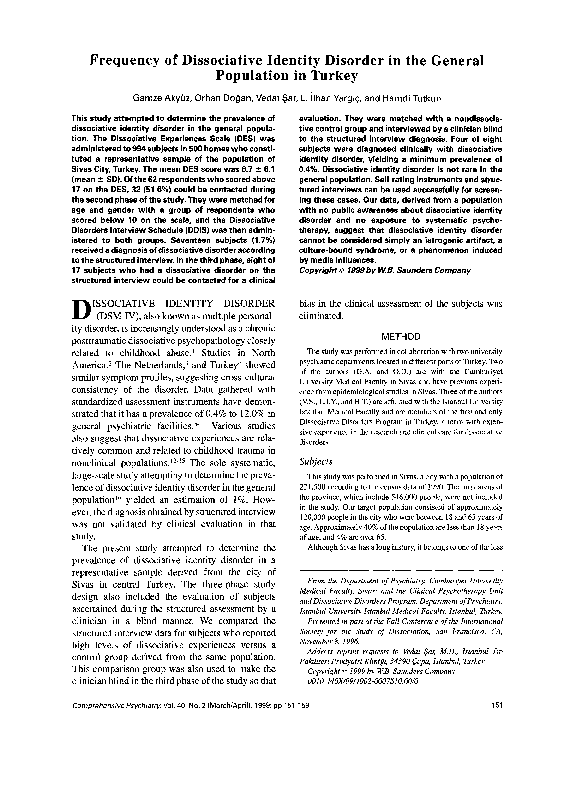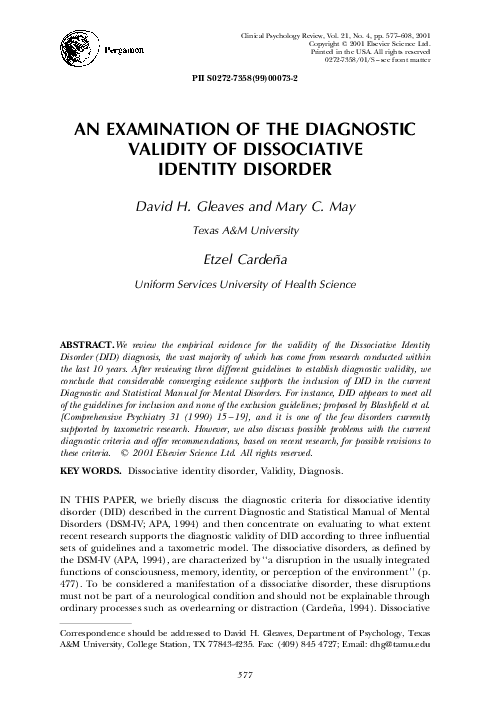
Publication types
The loss of memory is unforgiving and can be dangerous. Dissociative Identity Disorder is a psychological/memory loss disorder that can stem from early childhood abuse which includes extreme physical, emotional, and sexual abuse against the child. Not all children who experience abuse as at risk for the disorder Dissociative identity disorder (DID), previously known as multiple personality disorder (MPD) and colloquially known as split personality disorder, [7] is a mental disorder characterized by the maintenance of at least two distinct and relatively enduring personality states. [3] Abstract. A brief description of the controversies surrounding the diagnosis of dissociative identity disorder is presented, followed by a discussion of the proposed similarities and differences between dissociative identity disorder and borderline personality disorder. The phenomenon of autohypnosis in the context of early childhood sexual trauma

Case Example: Mary (As Mary, Edith, “Baby”)
The loss of memory is unforgiving and can be dangerous. Dissociative Identity Disorder is a psychological/memory loss disorder that can stem from early childhood abuse which includes extreme physical, emotional, and sexual abuse against the child. Not all children who experience abuse as at risk for the disorder Dissociative Identity Disorder 2 Integrative Research Paper: Dissociative Identity Disorder Few psychological disorders in the Diagnostic Statistical Manual have generated as much controversy as Dissociative Identity Disorder (DID). For the past 35 years diagnoses of DID, previously referred to as Multiple Personality Disorder (MPD), have Abstract. A brief description of the controversies surrounding the diagnosis of dissociative identity disorder is presented, followed by a discussion of the proposed similarities and differences between dissociative identity disorder and borderline personality disorder. The phenomenon of autohypnosis in the context of early childhood sexual trauma

Navigation menu
Dissociative identity disorder (DID), previously known as multiple personality disorder (MPD) and colloquially known as split personality disorder, [7] is a mental disorder characterized by the maintenance of at least two distinct and relatively enduring personality states. [3] Dissociative Identity Disorder 2 Integrative Research Paper: Dissociative Identity Disorder Few psychological disorders in the Diagnostic Statistical Manual have generated as much controversy as Dissociative Identity Disorder (DID). For the past 35 years diagnoses of DID, previously referred to as Multiple Personality Disorder (MPD), have The loss of memory is unforgiving and can be dangerous. Dissociative Identity Disorder is a psychological/memory loss disorder that can stem from early childhood abuse which includes extreme physical, emotional, and sexual abuse against the child. Not all children who experience abuse as at risk for the disorder

The loss of memory is unforgiving and can be dangerous. Dissociative Identity Disorder is a psychological/memory loss disorder that can stem from early childhood abuse which includes extreme physical, emotional, and sexual abuse against the child. Not all children who experience abuse as at risk for the disorder Abstract Objective: Despite its long and auspicious place in the history of psychiatry, dissociative identity disorder (DID) has been associated with controversy. This paper aims to examine the empirical data related to DID and outline the contextual challenges to its scientific blogger.com: Martin J Dorahy, Bethany L Brand, Vedat Şar, Christa Krüger, Pam Stavropoulos, Alfonso Martínez-Tabo Download full paper NOW! ⬇️ TOPIC: Term Paper on Dissociative Identity Disorder (Did), or Assignment In order to understand DID, it is critical to understand what psychologists and psychiatrists mean by the term "dissociation." Dissociation refers to the idea that a person is not fully relating to his or her own personality

· Abstract Objective: Despite its long and auspicious place in the history of psychiatry, dissociative identity disorder (DID) has been associated with Dissociative Identity Disorder Porsha Castillo Belhaven University ABSTRACT This paper will focus on the mental disorder Dissociative Identity Disorder. It will follow the case study of JANE. The paper will include the hisroty of the disorder as well as treatment, and current research of Download full paper NOW! ⬇️ TOPIC: Term Paper on Dissociative Identity Disorder (Did), or Assignment In order to understand DID, it is critical to understand what psychologists and psychiatrists mean by the term "dissociation." Dissociation refers to the idea that a person is not fully relating to his or her own personality
No comments:
Post a Comment